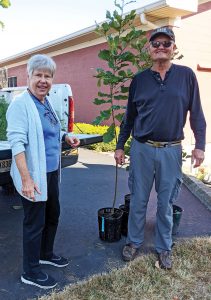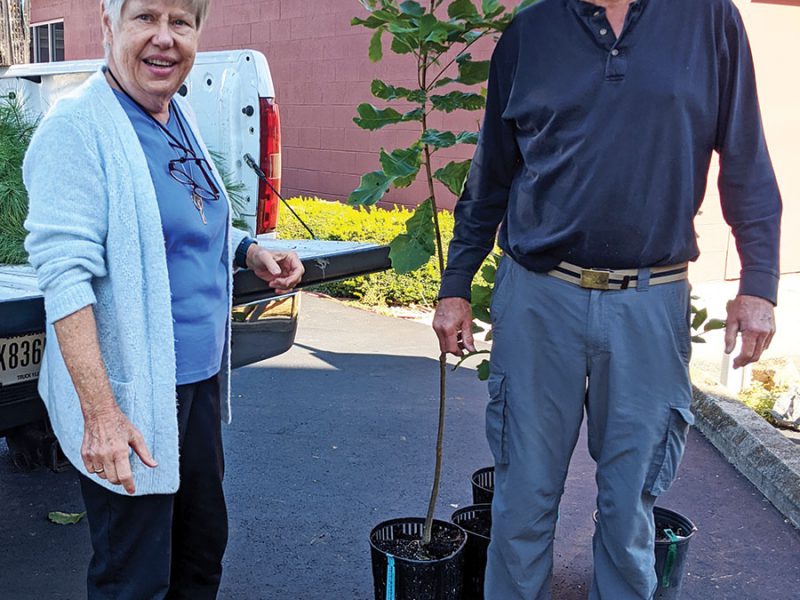This is an article by John Shaughnessy. It was originally published in The Criterion on May 14, 2021.

As Franciscan Sister Joan Miller roams through her parish’s grounds marked by bird houses, recently planted trees and wildflowers that attract bees and butterflies, she believes that she and her fellow parishioners are preserving the beauty of God’s creation.
When Cliff Burk talks about the solar panels that his parish has added to its buildings, he calls it “a gift to the next generation.”
And when Paige Kervan gives a tour of the conservation efforts her parish has undertaken, she says, “The way we’re supposed to live our Catholic faith is to respect all life, including respect for our planet.”
Burk, Kervan, Sister Joan and their parishes are striving to live out the goals of Pope Francis’ 2015 encyclical, “Laudato Si’: On Care for Our Common Home.”
This year, the pope has proclaimed May 16-24 as Laudato Si’ Week, which is described on the Vatican website as a celebration of “the great progress the whole Church has made on its journey to ecological conversion.”
In the archdiocese, that conversion sometimes has taken place in bold ways, such as the 320 solar panels that have been added to the buildings of St. John the Apostle Parish in Bloomington.
It has also occurred in the equally important “grassroot” efforts at Kervan’s home parish—Our Lady of Lourdes in Indianapolis—and Sister Joan’s home parish—St. Vincent de Paul in Shelby County—as well as other faith communities across the archdiocese.
Still, there is much more work to be done, say the leaders of the archdiocese’s Creation Care Commission, and the greatest impact of that effort will need to happen at the parish level.
A commitment to care
“There are two important reasons why parishes must be involved with this effort,” says Rosemary Spalding, a member of the archdiocese’s Creation Care Commission.
“First, the archdiocese has more than 125 parishes, each with buildings and many with a school. Collectively, these parishes and schools contribute significantly to the carbon footprint of the archdiocese and the negative impacts to the environment.”
She also believes “the parishes can be the most effective messengers to the faithful on all aspects of creation care”—by providing information through their bulletins, ministries and “of course, the pulpit.”
Father Rick Ginther has embraced that approach as the pastor of Our Lady of Lourdes Parish. By making “creation care” part of the parish mission, he believes it sets an example for parishioners to follow personally.
“I find the mantra, ‘reuse, recycle, renew,’ helpful,” he says. “It plants the seed of the idea—the truth—of our planet home’s need for our kindness. It plants the seed that our neighbor—next door and around the world—depends upon what we do in caring for creation. And finally, it plants the seed that our children and grandchildren, born and yet to be born, are relying upon our present, persistent commitment.”
Paige Kervan’s commitment to caring for the environment intensified after she and her husband Kevin were part of the team charged with the recycling effort during Our Lady of Lourdes’ Fall Festival in 2019. The mother of two grown children couldn’t believe the total weight and volume of what was collected, and what had been discarded and wasted.
When she mentioned her concern to Father Ginther, he told her he needed to get her on the parish’s Creation Care Committee. Soon, she was leading the parish’s grassroots efforts.
Rain barrels have been placed around the parish’s campus, collecting water that is used to nourish plants and flowers. A plan has been made to eliminate the use of Styrofoam at the parish by the end of 2021. A connection has been made with Keep Indianapolis Beautiful to plant trees throughout the parish’s boundaries this fall.
Efforts have also been made toward composting and purchasing reusable dishes and flatware instead of plastic ones. And the school’s kitchen staff has placed an increased emphasis on recycling and using sustainable products.
“We have an obligation to give back to the Earth and the environment,” Kervan says. “It really doesn’t require a lot of money to make a difference. It’s our responsibility to make attempts. And small attempts help to sustain the environment.”
Echoing a major theme that Pope Francis shares in Laudato Si’, she adds, “We have an obligation to look out for our fellow man and neighbors. And part of that is making sure we have a healthy environment to live in.”
Cliff Burk has a similar thought when he considers the addition of 320 solar panels to the buildings of St. John the Apostle Parish in Bloomington.
‘I’m glad we’re doing something’
The 74-year-old retired engineer used his science background to support the goals of Laudato Si’ when he helped to lead the parish’s effort to install solar panels on its buildings in late 2017. The parish paid $180,000 for the solar panel system, Burk noted.
As the gleaming blue solar panels absorb the sun’s rays and convert the energy into electricity that provides power to the parish school, rectory and church, they’ve had a dramatic impact in helping reduce the parish’s electricity costs. So have replacing the parish’s indoor lights with LED lights and updating heating and air conditioning units with more energy-efficient ones.
In 2014, electric bills had crept up to more than $23,000, Burk said, noting that electric bills in 2020 were about $1,500.
The impact on the environment has been dramatic, too.
“The reporting system for the solar panels is telling us that 523,000 pounds of carbon dioxide have been saved,” Burk said about the major greenhouse gas that scientists maintain has contributed significantly to global warming. “That’s about 262 tons of carbon dioxide that has been saved. That’s equivalent to [the impact of] planting 3,300 trees.”
Burk acknowledges that there are fellow parishioners who have questioned the high, initial cost of the solar panels. And there’s the reality that such a system may not be financially feasible or fitting for the needs of other parishes.
“Many people in the parish get concerned that it’s going to take 12 to 14 years to recoup the cost of the system,” he says. “Then there are others who say, ‘I’m more in tune with creation and the encyclical, and I’m glad we’re doing something.’ ”
Burk personally considers the system as “a gift to the next generation.”
“I’m not one to study encyclicals, but the idea of taking care of the Earth and improving people’s health is near and dear to anyone who has children. It should be near and dear to everyone.”
The combined efforts of different generations have led to another kind of environmental transformation at St. Vincent de Paul Parish, a rural faith community in Shelby County.
‘This world is all we have’
As the parish life coordinator of St. Vincent de Paul Parish, Sister Joan wanted to do something more, several years ago, with three acres of unused land in the parish.
When she had previously watched the land become overgrown and then need to be mowed down, she worried about what happened to the animals who made their nests and homes there. So she decided to transform the area.
“We’ve planted wildflowers which are good for bees and butterflies,” she says. “We’ve planted about 20 trees. There’s a bench to sit [on] and a path you can walk. The kids made bird houses. They put them together and painted them. The birds come and build their nests. There’s also a bee house. We’ve got to save the bees and the butterflies.”
Known as the Pollinator Habitat, the transformed area is one part of the parish’s grassroots effort to bring Laudato Si’ to life. Recycling, reducing the use of Styrofoam and plastic and trapping rainwater to water the plants and flowers of the parish also fit into that goal.
“It’s all little things, but they’re things we can do every day,” Sister Joan says. “There’s one lady who goes down her lane and picks up trash. If everybody did their little bit, it would make a big difference.
“Pope Francis says we need to care for our Earth. This world is all we have. We have to take care of it for future generations.”
Contact us at the Archdiocesan Creation Care Ministry if you need help forming or developing a creation care ministry at your parish!

